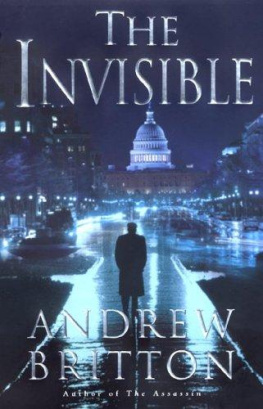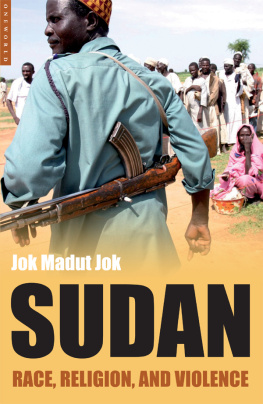CHAPTER 1
CAMP HADITH, WEST DARFUR
APRIL
T o the untrained eye, the inhabitants of Camp Hadith might have seemed like any group of refugees the world overa cluster of lost souls bound by poverty, persecution, and a complete lack of hope. To the untrained eye, they might have seemed tragically the same. But in reality their squalid existence was one of the few things they had in common.
They comprised a strange demographic made up of black Christians from the south, African Muslims from the north, and poor Arabs from the slums outside Khartoum. They came from a multitude of tribes, which was arguably more important than their religious differences given the lack of a single national identity in Africas largest country. They were Dinka, Masalit, and Fur. They were Berti, Bargo, and Beni Jarrar. But while sharing only the terrible circumstances that had thrust them together, they could all agree on this: were it not for the womanthe American nursetheir life in the camp would have been a living hell.
As it stood, they endured a daily struggle for survival despite the womans devotion to them and their unrelenting plight, which was apparent to all. Situated one kilometer east of the paved road from Al-Geneina to Nyalathe capital city of South Darfurthe temporary settlement consisted of nothing more than three hundred hastily constructed shelters. Most were crudely composed of clothes, rugs, and plastic trash bags draped over a rough framework of interwoven branches. A few lucky familiesthose who had arrived in the early stages of the camps developmenthad access to sturdy canvas tents supplied by USAID, also known as the United States Agency for International Development; UNICEF; or Mdicins Sans Frontires, the Paris-based organization better known as Doctors Without Borders.
Surrounding the entire camp was a two-and-a-half-meter fence as crude and impermanent as the tents it was meant to secure. Covered by black tarpaulin sheets, its wooden poles were spaced at three-meter intervals and thrust two meters into the sodden earth to provide a reasonably stable frame for the makeshift barrier. The fence, in turn, was topped by a single strand of barbed wire that ran the length of the perimeter. Beyond it there was nothing but the road and the sun-scrubbed landscape, which stretched for miles in every direction.
The hospital, the only permanent structure to be found within the flimsy tarpaulin fence, rose like an island from the sweeping sea of tents. It was a sprawling, one-story structure of reddish brown mud bricks, each of which had been forged by a careful pair of hands before being laid out to bake in the harsh African sun. The humble building was topped by a roof of corrugated tin, its windows sealed with clear plastic, which provided some protection against the tiny winged predators whose flights could be as lethal as that of any stealth assassins in that part of the world.
Both the flies and the mosquitoes could kill a healthy aid worker with a single bite or sting, especially when the rains came in late July. For the vast majority of Camp Hadiths residents, the risk was far greater. Unless caught at an early stage, malaria was a virtual death sentence in the internally displaced persons campsthe young and the very old being at highest risk. African trypanosomiasis, or sleeping sickness, could be added to the long list of rampant scourges that included measles, tuberculosis, and the worst killer of all, the HIV retrovirus, which had held the continent in its iron grip for decades.
And, of course, there was the poverty and ignorance. The terrible, persistent unavailability of basic health care, education, and nutrition, which flung open the doors to every opportunistic strain of disease emerging from the steppes and woodlands to the north.
Never far from the nurses mind, the many dangers that plagued the camp accounted for her sense of profound sorrow as she quietly made her way down the narrow aisle separating the hospitals forty beds. She always felt this way when she stopped to consider the magnitude of what the African people had suffered. Of what they still suffered on an hourly and daily basis. Lily Durant had been in West Darfur for just six months, but during that time she had come to see the true depth of hardship that her patients endured. Not to understand it, but to see it in front of her, around her, everywhere.
For Lily, that was an important distinction. She wanted to help these people, but she didnt claim to identify with them. Nor did she pretend to understand what they were going through. Her refusal to do so wasnt a matter of Western arrogancein fact, it was the complete opposite. In Lilys eyes, the situation was simple. She was there to help. Not to judge, not to empathize, not to intellectualize. But to help. Nothing more, nothing less.
Reaching the end of the aisle now, she heard a small noise to her right. As she turned toward the sound to check it out, she moved quickly to the side of the bed and knelt by the hard mattress. Her calves and thighs immediately screamed out in protest, as if to remind her that shed been on her feet for the past twenty hours. But Lily ignored the pain and focused on the patient lying before her.
She leaned forward, her fingers brushing against the mosquito net that covered the squirming figure.
Hello, Limya. Badai lo cadai? she whispered, asking the sick girl if she needed anything in the Zaghawa tribal dialect. It was one of many local phrases Lily had made it a personal imperative to master. While it was nearly impossible to absorb all the languages of the camp, she had found that even a few key phrases could help bridge the cultural and linguistic divide.
Do you need anything? And they all did. More than any one person could give. But nothing was worse than nothing, and that was the sum total of indifference.
Lily felt shed waited a long time before the patient replied. Then, without warning, the girl let out a short, high-pitched squeal that sent a shiver of alarm through Lilys body. She grasped blindly for the girls fragile hand through the mosquito netting. When she found it, she squeezed it gently in an attempt to reassure her. Only then did Lily realize that the girl was dreaming, caught up in the tangled web of her own terrible past.
She continued to squirm and cry out for a few minutes longer. After what seemed like an eternity, the moaning began to subside. Then it stopped altogether.












